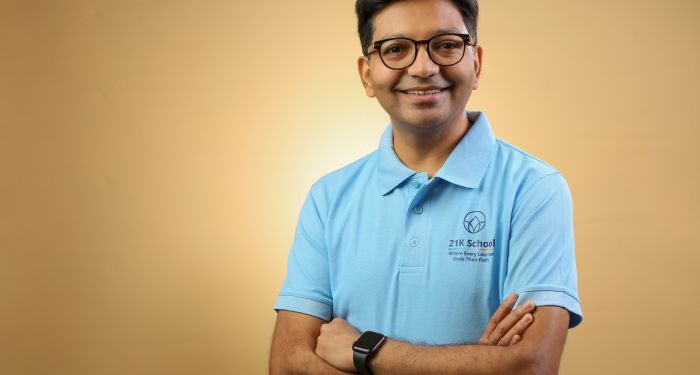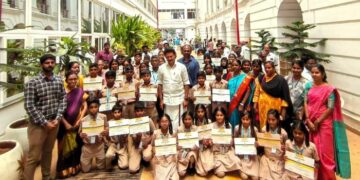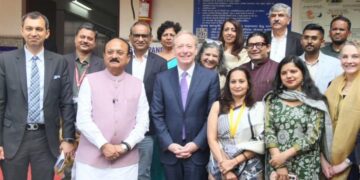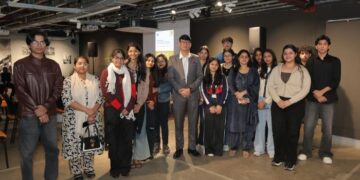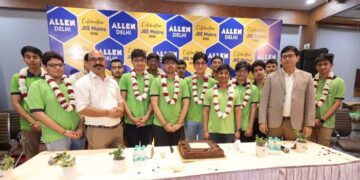In a world still grappling with the fallout of a pandemic and redefining what learning looks like, Yeshwanth Raj Parasmal stands out as a quiet disruptor. As the Founder & CEO of 21K School—India’s first online-only K–12 school—he is transforming education with a mission rooted in accessibility, affordability, and flexibility.
A finalist for the Study UK Alumni Awards 2022 in the Business and Innovation category and an alumnus of the University of Southampton, UK, Parasmal brings over 20 years of experience in the education sector. He specializes in strategic planning, systems development, and brand building—all now geared toward a singular goal: reshaping how India and the world perceive schooling.
Disruption, Not Just Innovation
Launched well before the COVID-19 pandemic forced the world to embrace digital learning, 21K School was conceived as a bold answer to the limitations of traditional education.
“We flip the conventional K-12 model by offering flexible, personalised learning powered by technology,” explains Parasmal. “It’s disruptive, yes—but not revolutionary in the sense of being completely new. The disruption lies in solving for learning outcomes while also addressing access, affordability, and scalability—challenges that previously seemed unsolvable together.”
That disruption is working. What began with 2,500 students during the height of COVID-19 has since tripled its learner base in just three years. The school now serves students across 78 countries and represents 52 nationalities.
Post-Pandemic Growth & Future Prospects
With physical schools making a strong comeback post-COVID, Parasmal remains confident in the staying power of online learning.
“Online schooling was never a stopgap solution—it’s a movement towards personalised education for the 21st century learner,” he says. Citing the National Education Policy as a strong catalyst, he points out that India’s vast and diverse geography necessitates scalable models of quality education—something online schools can uniquely offer.
Moreover, Parasmal notes an emerging shift in parental priorities. “More parents are looking beyond the traditional school experience—uniforms, buses, and PTMs—and asking: is my child actually learning, growing, and gaining essential life skills?”
This is why he believes online schooling is here to stay—not as a substitute, but as a credible, future-ready alternative. It can even supplement traditional schools by offering specialised subject choices under India’s National Credit Framework, particularly in higher grades.
Understanding the Modern Parent
Having authored a book on parenting, Parasmal is acutely aware of evolving expectations from today’s caregivers.
“Our parents rarely questioned school practices, but this generation does—and rightly so,” he says. “They expect accountability, flexibility, and personalised learning for their children. There’s growing awareness that grades alone don’t define a child’s future.”
He describes a phenomenon he calls “the romance of school”—a nostalgic, emotional connection many parents have with the schooling process. But over time, many discover that this romance often fades when learning gaps and lack of engagement emerge.
“That’s when they start exploring unschooling, road schooling, home schooling—and now, online schooling.”
A Global Perspective Shaped by the UK
Parasmal credits his transformative journey to his education in the UK, particularly his MBA in Education Management from the University of Southampton. “I always dreamt of studying in the UK, inspired by leaders like Gandhi, Nehru, and Ramanujan,” he says.
His time in the UK offered more than academic enrichment. “It gave me cultural exposure, a global network, and the confidence to think beyond conventional boundaries. The British Council also played a key role in guiding me through this journey.”
The experience sharpened his skills in systems thinking, diversity management, and process orientation—skills that now underpin 21K School’s strategic operations.
In 2022, his contributions were recognised when he was shortlisted for the British Council UK Alumni Awards, a nod to how his UK education has directly impacted innovation in the Indian education sector.
The Road Ahead: Reforming Indian Schooling
Parasmal is clear-eyed about the reforms India’s school system urgently needs.
“India is one of the few countries that doesn’t allow for-profit schools, which stifles innovation. Education, like healthcare, should welcome both charitable and for-profit models,” he says.
He also advocates for formal recognition of online schools by national boards like CBSE and CISCE, which he believes would help position India as a true global education leader—a Vishwaguru in the truest sense.
But the most pressing issue, he says, is the curriculum itself. “We must stop designing education for the last-mile learner. Children are bored. They aren’t being challenged. The current model takes 15 years to teach what can be learned in half the time if done right.”
Conclusion: From a Vision to a Movement
For Yeshwanth Raj Parasmal, 21K School is not just an institution—it’s a statement. It’s a direct response to a system that needs rethinking and reimagining. With every new student enrolled, every new partnership formed, and every skeptical parent converted, that vision gets a little closer to becoming the norm.
“Education must evolve with the learner. And the learner today is digital, curious, and unafraid. Schools must catch up,” he says.
In the story of India’s educational transformation, Parasmal is not just a participant—he’s helping script the next chapter.


